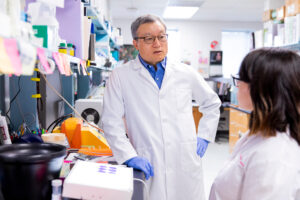A team of researchers led by scientists at the University of Georgia and the Cincinnati Children’s Hospital Medical Center are near the completion of a phase 1 clinical trial for a new single-dose intranasal COVID vaccine.
Unlike traditional vaccines that require an injection, this vaccine is administered through a nasal spray similar to those commonly used to vaccinate against influenza. A fine mist inhaled through the nostrils allows the vaccine to target the mucosal cells that line the nasal passages and airways.
Phase 1 clinical trials were conducted at four sites in Kentucky, New York, Ohio, and Texas. The trials are based on encouraging preclinical results reported in the peer-reviewed journal Science Advances.
“We have been developing this vaccine platform for more than 20 years, and we began working on new vaccine formulations to combat COVID-19 during the early days of the pandemic,” says Biao He, a professor in UGA’s Department of Infectious Diseases in the College of Veterinary Medicine. “Our preclinical data show that this vaccine not only protects against infection but also significantly reduces the chances of transmission.”
The Advantages of Nasal Spray Vaccines
He and his collaborators developed the vaccine by inserting a portion of the SARS-CoV-2 spike protein into another virus known as parainfluenza virus 5, or PIV5, which is thought to contribute to upper respiratory infections in dogs but is completely harmless to humans.

A team co-led by UGA professor Biao He, pictured above, has been developing vaccines for more than 20 years. Researchers recently applied their technology to a nasal spray vaccine for COVID-19. (Photo by Andrew Davis Tucker/UGA)
The modified PIV5 virus acts as a delivery vehicle that produces proteins found in the coronavirus and prompts the immune system to mount a defense—ultimately promoting immunity to infection.
Most people contract COVID-19 through droplets from infected individuals when they cough or sneeze. Those droplets go into a person’s upper airways, and that’s where the virus begins replicating so it can spread throughout the lungs and other parts of the body.
“This vaccine targets those areas specifically and creates lasting immunity at the site of infection,” says Mark Tompkins, professor of infectious diseases at UGA and a member of the research team.
Dan Wagner, a clinical trial volunteer from Cincinnati, told USA Today that he had experienced no side effects and that he’s hopeful about the vaccine.
“I wanted a vaccine that protects other people too, not just myself,” Wagner said.
Promising results
Previous studies showed that the vaccine produced a localized immune response, involving antibodies and cellular immunity, that completely protected mice from fatal doses of SARS-CoV-2. The vaccine also prevented infection in ferrets and, importantly, appeared to block transmission of COVID-19 between animals.
The vaccine used in the trial only requires a single dose, and it can be stored at normal refrigerator temperatures for up to three months, He said. Because it is given intranasally, the vaccine is also easier to administer, especially for those with a fear of needles.
Previous studies showed the vaccine platform completely protects experimental animals from another dangerous coronavirus, Middle Eastern Respiratory Syndrome. The disease, also known as MERS, was first reported in Saudi Arabia in 2012.
“We are all very fortunate to have a team of dedicated scientists who made the development of this vaccine possible,” He says. “We are eager to see the results from the phase 1 clinical trial, and we want to move this technology forward as fast as possible so that we can help control the COVID-19 pandemic.”
This research was supported by CyanVac, a startup company developing vaccines based on the PIV5 technology. The company is supported by Georgia Research Alliance and is based in the University of Georgia’s business incubator.
This story will appear in the Fall 2022 issue of Georgia Magazine.








